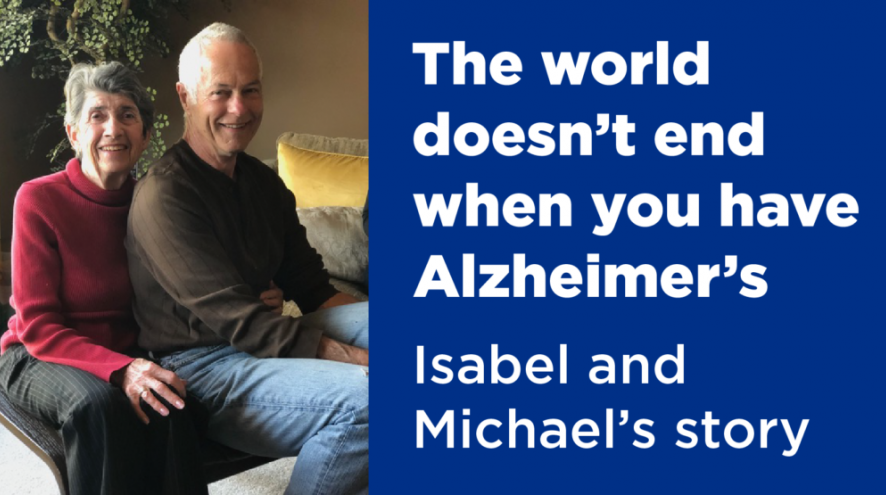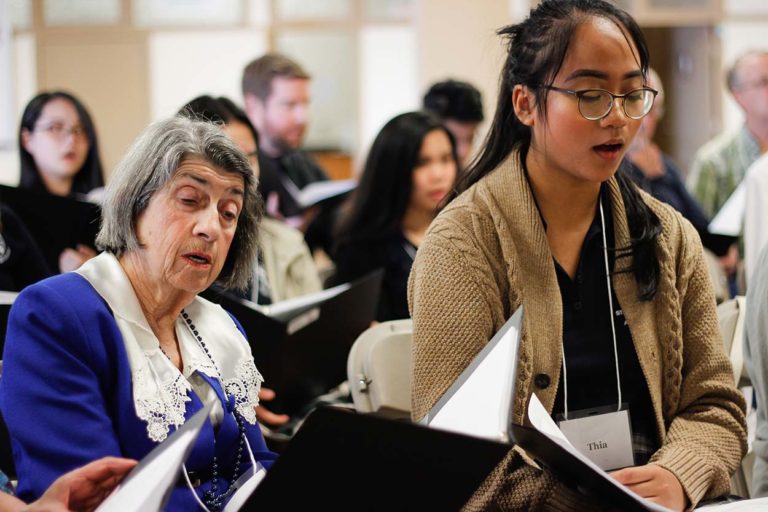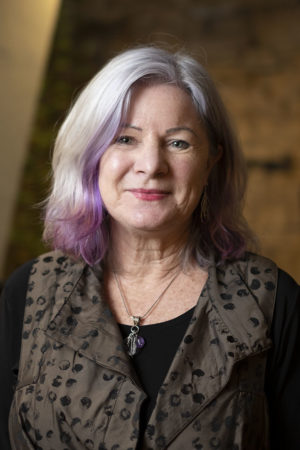The world doesn’t end when you have Alzheimer’s: Isabel and Michael’s story
By Michael | Alzheimer Society of Canada, October 2, 2019
Isabel, a retired teacher, and Michael, a military veteran, live in Victoria, British Columbia. Happily married for more than 50 years, they first met at a mess hall in Greenwood, Nova Scotia, in 1961. Today, Isabel is living with Alzheimer’s disease. Here, Michael tells the story of their life after diagnosis.

My wife, Isabel, was diagnosed with Alzheimer’s disease in January 2011. At that time, she was 70 years old.
I had been aware for a year or so that things weren’t right. The repetitive questioning, poor cognition, getting lost in familiar places, etc., were all signs which made me worry and wonder. Eventually, I asked our GP, who admitted he was concerned as well, mainly due to her unusual responses to basic medical questions. She was tested, diagnosed and soon after lost her driving licence.
That was probably the worst day of our lives. Isabel was devastated—her initial reaction was anger, disbelief and confusion. I think we were both in denial with little insight into this tragic diagnosis. After all, our lives had changed immediately.

Isabel decided to search for reasons. She needed to know what had caused this. Was it hereditary? Was it the skiing accident five years ago? Meanwhile, I started research on how to deal with our new situation.
At first, she could not bring herself to tell anyone. The shame, the stigma. What would people think? It took four years before she could say, “Someone told me I have memory loss”. She still could not say the word “Alzheimer’s”. Those first four years were the worst part of this journey.
Now, there is more insight and more understanding, and we both have come to realize that a diagnosis of dementia is not the end of the world. We continued our travelling adventures until 2017. In August of that year, we made it to the top of the Ramoljoch pass in Austria, over 3000 metres high!
That, unfortunately, would be our last trip together. Since then, Isabel’s Alzheimer’s has progressed further, and flying or traveling far from home is now out of the question. Though we travelled world-wide after her diagnosis, Isabel still looked for challenges, just to convince herself and others that she could still “do it”.
So, she started running. In fact, she signed up for the TC 10K run here in Victoria. There were still difficulties—we joined a running clinic but Isabel had to be watched closely because she would sometimes get lost and confused about a “training schedule”.
But, she persisted, and in her first race Isabel took the silver medal in her age category. She was upset and silently accused the winner of cheating! The following year, she won gold. A tough woman this one!

And then the Voices in Motion choir came along. Another challenge! We both agreed that we needed the social contact as well as the opportunity to sing. We already belonged to another choir, which Isabel helped set up back in 2012, so this was a natural progression.
Voices in Motion has been an absolutely wonderful experience for both of us. It’s not often these days that Isabel can relax and find something that she enjoys doing, without feeling pressure to do it. This is family, and she’s made good friends here in addition to enjoying the pleasures of singing.
I have found that one of the most difficult things in caregiving is keeping Isabel busy. At this stage in her journey, she cannot read or write. She’s lost the use of her words, nor can she cook or take care of herself. So, she will sit and stare or wander aimlessly around the house. This is my biggest challenge.
The Choir helps fill that need — too bad the two terms are so short! We do our best to advocate for Alzheimer’s and were active in fundraising for the local IG Wealth Management Walk for Alzheimer’s in Victoria. We named our team, “Voices in Motion” (what else!) and raised close to four thousand dollars. We received tremendous support from our friends, family and members of the Voices in Motion choir.

I think our story needs to be told. People living with Alzheimer’s need to know about the power of singing with a choir such as Voices in Motion. The results are truly dramatic and therapeutic. Two hours of singing with our choir is worth a dozen of the adult day programs she goes to each week, although they are very useful too!
Although her disease has progressed considerably since the filming of this video in early March, Isabel and I would like you to know that a diagnosis is not the end of the world. It’s just a question of how one deals with it.
UPDATE OCTOBER 8, 2020:
Unfortunately, there is a sad sequel to the story. Isabel continued to progress after the blog was written and I realized that I could no longer continue to provide the care she needed at home.
On August 20, we placed her in a long-term care home here in Victoria, and she remains there now. It was a very tough decision but one that had to be made. It has taken her a while but we feel she has finally settled into her new surroundings.
It has been a long and difficult journey, but we are so glad we did what we did—when we did—and we were able to deal with the diagnosis in our own way.
– Michael
If someone in your family has been diagnosed with dementia and you’re wondering what to do next, check out our page First steps for families for tips and support.
If you are interested in learning more about Voices in Motion, please check out www.voicesinmotionchoirs.org or contact info@voicesinmotionchoirs.org
About This Article:
A Life Worth Living has copied the content of this article under fair use in order to preserve as a post in our resource library for preservation in accessible format. Explicit permission pending.
Link to Original Article: https://alzheimer.ca/en/whats-happening/news/world-doesnt-end-when-you-have-alzheimers-isabel-michaels-story

